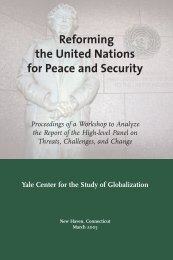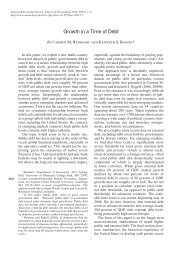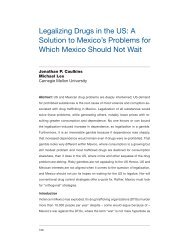The collapse of global trade, murky protectionism, and the crisis:
The collapse of global trade, murky protectionism, and the crisis:
The collapse of global trade, murky protectionism, and the crisis:
Create successful ePaper yourself
Turn your PDF publications into a flip-book with our unique Google optimized e-Paper software.
<strong>The</strong> <strong>collapse</strong> <strong>of</strong> <strong>global</strong> <strong>trade</strong>, <strong>murky</strong> <strong>protectionism</strong>, <strong>and</strong> <strong>the</strong> <strong>crisis</strong><br />
Figure 2 A supply chain example. (This shows <strong>the</strong> nations where parts are sourced for a harddisk<br />
drive assembled in Thail<strong>and</strong>.)<br />
USA<br />
Disk, Head,<br />
Suspension<br />
Mexic<br />
o<br />
Head<br />
Thail<strong>and</strong><br />
Spindle Motor, Base,<br />
Carriage, Flex Cable,<br />
Pivot, Seal, VCM,<br />
Top Cover, PCBA,<br />
HGA, HAS<br />
Malaysia<br />
Base, Pivot, Spacer,<br />
VCM, Base Card, Top<br />
Clamp, Disk<br />
China<br />
PCBA, Carriage<br />
HGA, Base, Head<br />
Suspension<br />
Hong<br />
Kong<br />
Filter<br />
Cap<br />
Taiwan<br />
Top<br />
Clamp<br />
Philippines<br />
Damping Plate,<br />
Coil Support,<br />
PCBA<br />
Japan<br />
Cover, Disk, Screw,<br />
Seal, Ramp, Top<br />
Clamp, Latch, Plate<br />
Case, Label, Filter<br />
PCBA, Suspension<br />
Singapore<br />
Cover, Screw,<br />
Pivot, PC ADP,<br />
disc<br />
Indonesia<br />
Suspension, VCM,<br />
PCBA<br />
Source: Baldwin (2008) based on data adapted from Hiratsuka (2005).<br />
likely connected to supply chains. <strong>The</strong> supply-chain nodes are in continuous communication<br />
to ensure <strong>the</strong> flow <strong>of</strong> parts <strong>and</strong> components just matches <strong>the</strong> dem<strong>and</strong> for<br />
final goods. When <strong>the</strong> message comes that one less laptop needs to be assembled in<br />
China, <strong>the</strong> entire supply chain scales back immediately. This is surely one part <strong>of</strong> <strong>the</strong><br />
remarkable synchronicity <strong>of</strong> <strong>the</strong> <strong>global</strong> <strong>trade</strong> <strong>collapse</strong>.<br />
Finally, supply chains may also account for <strong>the</strong> nature <strong>of</strong> <strong>the</strong> protectionist reaction.<br />
In <strong>the</strong> modern world <strong>of</strong> manufactures <strong>trade</strong>, <strong>the</strong> competitiveness <strong>of</strong> a nation's exports<br />
is directly connected to <strong>the</strong> cost <strong>of</strong> imported parts <strong>and</strong> components. This is why <strong>the</strong>re<br />
is little fear that emerging nations will raise <strong>the</strong> tariffs that <strong>the</strong>y cut unilaterally over<br />
<strong>the</strong> past decades. This liberalisation focused on imported parts <strong>and</strong> components<br />
because cutting <strong>the</strong>se tariffs improved <strong>the</strong>ir manufacturers' competitiveness. Raising<br />
tariffs on manufactured imports – <strong>the</strong> vast major <strong>of</strong> which comprises parts <strong>and</strong> components<br />
– does not protect domestic manufacturing jobs, it destroys <strong>the</strong>m.<br />
Trade finance has dried up<br />
Lack <strong>of</strong> <strong>trade</strong> credit is also part <strong>of</strong> <strong>the</strong> problem, although as Marc Auboin notes in<br />
Chapter 15, data on <strong>trade</strong> credit financing is so poor that we cannot quantify <strong>the</strong><br />
impact. Still, experts reckon <strong>the</strong>y underst<strong>and</strong> <strong>the</strong> harmful dynamics currently at<br />
3





